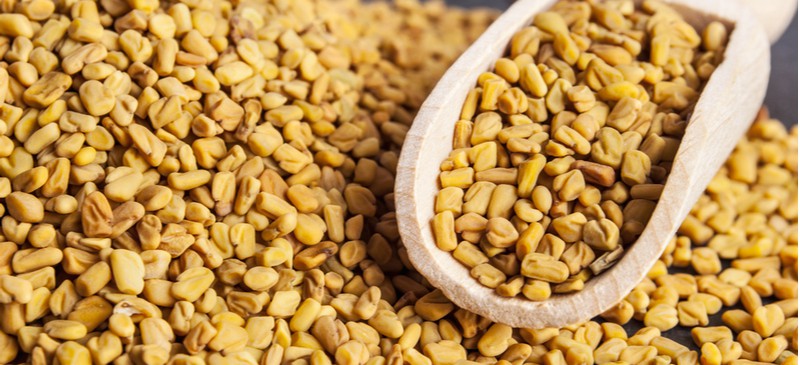
Fenugreek is considered one of the oldest medicinal plants, and its health-promoting properties have been cited in Traditional Chinese Medicine and Ayurvedic Medicine. Fenugreek seeds, in particular, have been used therapeutically for a range of health concerns, from diabetes and high cholesterol to low libido and breast milk production.
Whether you plan to add these seeds to your salads and stews or take fenugreek seed supplements as natural remedies, this powerful herb is worth your attention and makes an excellent addition to your wellness routine.
What Are Fenugreek Seeds?
Fenugreek (Trigonella foenum-graecum) is a medicinal plant that belongs to the Fabaceae family, and it used extensively in various parts of the world as an herb, food, spice and therapeutic agent.
Fenugreek seeds are particularly popular and commonly used in kitchens throughout India. The seeds are also ground or pressed to make extractions for medicine.
Studies done on fenugreek seed extracts show that they contain:
- flavonoids
- terpenoids
- phenols
- proteins
- saponins
- tannins
When it comes to the seed contents, 28 percent is protein, 16 percent is carbohydrate, 5 percent is oils and almost 4 percent is fatty acids. A whopping 26 percent of the seed’s content is made up of galactomannan, a polysaccharide and soluble fiber that plays a role in lowering glucose uptake.
This diverse array of phytoconstituents is responsible for the many fenugreek seeds benefits. The seeds are even used in Africa as a supplement during bread preparation in order to enhance the nutritional quality of the food.
Traditionally, fenugreek seeds have been used in medicine to improve several health conditions. They’ve also been used as antioxidant, anti-inflammatory, anticancer, antibacterial, antifungal and hepatoprotective agents.
In addition, they are cooked and added to meals for their lightly bitter taste, resembling celery or maple syrup.
The seeds are the most widely used part of the herb. They’re usually dried and ground, or fenugreek oil is extracted from the seeds.
Benefits
1. Reduce Blood Sugar
A study published in An International Quarterly Journal of Research in Ayurveda found that simply adding fenugreek seeds to the diet of patients with type 2 diabetes was able to significantly reduce fasting blood glucose levels after five months.
The study group received 10 grams of fenugreek seeds soaked in hot water every day, while the placebo group received nothing. Researchers concluded that a simple complementary addition of fenugreek seeds can have a synergistic effect along with diet control and exercise on fasting glucose.
Other studies have displayed that fenugreek seeds serve as potential antidiabetic agents. Supplementing with the seeds has helped reduce the outbreak of type 2 diabetes in prediabetic patients.
2. Fight Metabolic Syndrome
A recent study published in Scientific Reports indicates that fenugreek consumption has significant effects on gut microbiota and may affect body weight by reducing high-fat diet-induced hyperlipidemia, or high cholesterol.
Reports suggest that the efficacy of fenugreek for metabolic syndrome comes from the herb’s ability to inhibit intestinal glucose absorption and slow down digestion, which improves cholesterol levels and inflammation.
3. May Improve Cholesterol
A study published in Obesity found that fenugreek seeds significantly decreased triglycerides and cholesterol concentration. The study, done on mice, concluded that fenugreek reduces fat accumulation and LDL cholesterol, making it a potential tool in the management of high cholesterol and associated metabolic disorders.
READ RELATED: Is a Juice Cleanse Worth Doing?
4. Aid Digestion
The water-soluble fiber in fenugreek helps relieve digestive issues like upset stomach and constipation. Research shows that the fiber in fenugreek helps slow down digestion and also helps flush out harmful toxins from the body.
Fenugreek seeds also help reduce inflammation and may improve inflammatory digestive conditions, like ulcerative colitis.
5. Promote Breast Milk Production
Fenugreek seeds are known for their ability to act as a galactagogue that promotes breast milk production. Women who experience low milk supply may increased milk production with fenugreek seed extracts.
It’s recommended that you contact a lactation consultant before using herbs for increased breast milk production.
6. Can Improve Exercise Performance and Stamina
Fenugreek is known to be useful in hormonal regulation, in particular for male impotence. It’s used to promote lean body mass and lower cholesterol.
It also helps enhance endurance capacity because the fatty acid content is used as an energy source.
Research on fenugreek for men notes that seed supplementation causes significant improvements in body fat without a reduction in muscle strength. For this reason, the seeds can be an asset for males during resistance training.
7. May Have Anticancer Effects
There is evidence suggesting that fenugreek seeds have anticancer properties and contain chemical constituents that may induce apoptosis. Studies have also found that the herb has a dose-dependent effect on human breast cancer cell line.
Popular Uses
Traditionally, fenugreek has been used as a culinary and medicinal herb.
The seeds have a strong aroma and bitter taste. They can be baked for a milder taste, ground and made into supplements, or consumed in extract form.
Some of the most common ways to use fenugreek seeds include:
- Digestion: Take fenugreek seed powder or supplements to help ease digestive issues like constipation and upset stomach.
- Inflammation: Fenugreek supplements, tea and extracts can be used to reduce inflammation. You can also use extracts topically for inflammatory skin conditions, like acne or irritations.
- Cholesterol: Drink fenugreek tea or use fenugreek capsules to help reduce high cholesterol levels and fight metabolic syndrome.
- Breast milk production: Using fenugreek supplements or tea may help with breast milk production, especially in the days immediately following childbirth.
- Physical endurance: Supplementing with fenugreek seed may help improve exercise performance and decrease body fat.
Unproven Remedies
While there are many animal and human studies on the efficacy of fenugreek seeds, some traditional uses for the herb have been unproven by research. This includes fenugreek’s use for health issues including:
- wound healing
- leg ulcers
- gout
- sciatica
- obesity
- cancer
- reproduction
Risks and Side Effects
Fenugreek can be allergenic to some people, especially people who have a known peanut allergy. It’s also not recommended that you use fenugreek when pregnant because there isn’t enough research on its safety.
Before using fenugreek for breast milk production, reach out to a lactation consultant or your health care professional first.
Final Thoughts
- Fenugreek is an herb that’s been used in folk medicine for thousands of years.
- The seeds from the plant are used for medicine to improve or prevent health issues related to cholesterol, inflammation, poor digestion and hormonal imbalances.
- Some well-known benefits of fenugreek seeds include promoting breast milk production, boosting physical endurance, relieving constipation, regulating blood sugar and lowering LDL cholesterol.
Source: Dr. Axe | Nutrition





